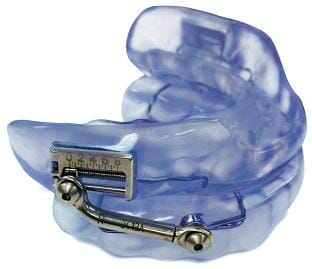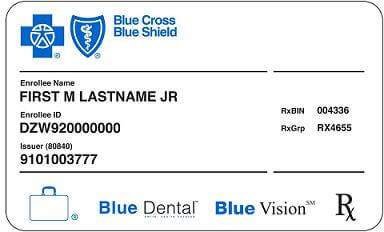The Debate Between the Prescribed SomnoDent and Non-Prescription Mouthpieces

The SomnoDent is a popular oral appliance that typically costs around $2,500
Oral appliances or dental appliances have been in existence for over 80 years now, although they have not been widely used to treat snoring and sleep apnea until the 1980’s when they were brought to light after several studies concluded that they were effective at treating both snoring and sleep apnea. Since then, dentists worldwide have been creating custom-fitted mouthpieces for their patients as an alternative to Continuous Positive Airway Pressure (CPAP) treatment. In comparison to the CPAP, oral appliances are more discrete, less cumbersome, and require no electricity to operate. Unlike a CPAP machine, the oral appliance can easily slide into ones pocket which makes transporting simple.
You may be more familiar with the term “Snoring Mouthpiece” which has been commonly used in television and internet advertising to describe this product while physicians refer to such devices as oral appliances. This term has become so popular over the past 20 years that the average consumer is 3 times more likely to recognize it by this slang term rather than it’s proper name. No matter what you call it, the oral appliances have become a popular choice when it comes to the treatment of snoring and mild to moderate sleep apnea and for many is often a suitable alternative to the CPAP which has been considered the gold standard for ages.
There are several options available for the treatment of Snoring and or Sleep Apnea, so why should you choose to go with an oral appliance? While the CPAP machine is very effective, it must travel with you every day, most likely for the remainder of your life. While CPAP machines have become more compact and quieter in recent years, there are still hoses and masks along with the unit which make it difficult to transport and require a source of power. Some models are noisy and some find that they dry out the airway. CPAP machines will also require periodic cleaning and service.
The oral appliances are a very effective treatment option that has years of scientific evidence proving their effectiveness treating snoring and sleep apnea. The fitting only takes a few minutes, although you may have to return to your dentist a few times to fine-tune your appliance.
With two different types available, both prescription and online ordered, there seems to be some confusion when it comes to differentiating the two.
Here are 5 reasons why you may choose a prescribed mouthpiece to treat your snoring or sleep apnea problem.
Why Choose a Professionally Fitted Mouthpiece Such As The SomnoDent?
Prescribed Devices Fit Better and Are More Comfortable
 Everyone’s mouth structure is different. Some people’s mouths are wide, some are narrow. The surface of each and every tooth is unique. Some have missing teeth while others have dental work such as crowns or bridges or even dentures. In other words, no two mouths are identical. When fitting an oral appliance, it’s very important that the device remains closed against the surface of each tooth, not only to increase the likelihood of the device being effective but also to provide the highest level of comfort possible. A properly fitted oral appliance such as the SomnoDent is very thin, yet durable and is more likely to be tolerated than one that has not been fitted properly . A poorly fitted mouthpiece will cause discomfort and is likely to be discontinued by the patient after only a few nights of use.
Everyone’s mouth structure is different. Some people’s mouths are wide, some are narrow. The surface of each and every tooth is unique. Some have missing teeth while others have dental work such as crowns or bridges or even dentures. In other words, no two mouths are identical. When fitting an oral appliance, it’s very important that the device remains closed against the surface of each tooth, not only to increase the likelihood of the device being effective but also to provide the highest level of comfort possible. A properly fitted oral appliance such as the SomnoDent is very thin, yet durable and is more likely to be tolerated than one that has not been fitted properly . A poorly fitted mouthpiece will cause discomfort and is likely to be discontinued by the patient after only a few nights of use.
Your dentist can help to evaluate your risk for sleep apnea or simple snoring, choose a mouthpiece that is best suited for your needs, and then customize it for a perfect fit.
Professionally Fitted Oral Appliances Are Adjustable
While having a professional create a custom mouthpiece that fits the contour of your mouth is important, having the ability to adjust your mouthpiece is also something to consider. Why does an oral appliance need to be adjusted?
To answer this question, it’s important to first understand that oral appliances work by holding the jaw forward which in turn, opens a restricted airway. A restricted airway causes OSA and is the area in which snoring typically originates from. An oral appliance positions the jaw forward while you sleep and prevents the airway from collapsing. For this reason, oral appliances are often referred to as a “Mandibular (Jaw) Advancement Device” or MAD.
In order to prevent snoring or to treat OSA, the lower tray must be adjusted so that the jaw is held forward slightly. The degree to which the tray is set forward is somewhat determined by trial and error. If the jaw is not advanced enough, the appliance will be ineffective and you will continue to snore or have apnea events. Too much advancement may cause discomfort and put excessive force on the teeth. A professional can listen to your feedback and make adjustments to increase or decrease the advancement of your device and make other adjustments to allow it to fit more comfortably and work effectively.
Better Materials & Better Construction Will Last Longer

The Pro-fitted mouthpiece is usually made from quality materials such as EVA.
Professionally fitted appliances will last for several years when properly cared for. Depending upon several factors such as whether or not you grind your teeth at night (Bruxism) and how you handle your appliance, you can expect for it to last up to five years or more. It’s important to note that there are several other factors which will determine how long a mouthpiece will last.
The type of material that the mouthpiece is constructed from also makes a difference when it comes to longevity. Materials that are commonly used in oral appliances include Hard Acrylics, Thermal Acrylics, Ethylene-Vinyl Acetate, Laminates, Biocompatible Polymer and Cobalt-Chromium Alloys. Each material has its own unique advantages and disadvantages which should be considered when making a selection.
Most professionally fitted appliances are well engineered and made from quality materials and are built within a lab using strict quality controls. By choosing the right appliance for your individual needs, you can count on several years of use before having to consider a replacement.
Your Insurance May Cover Some of the Cost
 Quality mouthpieces fitted by an industry professional can be quite expensive for most people. If you have good insurance coverage, you can save a significant amount of money on your mouthpiece. Most insurance companies, both private and government, provide some type of coverage to cover some of the cost of a Mandibular Advancement Device. Depending on your insurance provider, you may still have to pay up to $1k or more out of pocket.
Quality mouthpieces fitted by an industry professional can be quite expensive for most people. If you have good insurance coverage, you can save a significant amount of money on your mouthpiece. Most insurance companies, both private and government, provide some type of coverage to cover some of the cost of a Mandibular Advancement Device. Depending on your insurance provider, you may still have to pay up to $1k or more out of pocket.
Nearly all insurance companies will cover expenses that are medically necessary such as when a patient has Obstructive Sleep Apnea. Oral appliances used exclusively for simple snoring, or benign snoring are typically not covered by insurance companies. However, keep in mind that the presence of snoring and OSA are often closely related.
If you snore but have not been screened for OSA, it’s quite possible that an underlying sleep-related breathing disorder such as sleep apnea is present. In a recent analysis released by the American Academy of Sleep Medicine (AASM), it’s estimated that 29.4 million men and women have OSA, and many cases are currently undiagnosed. This represents 12% of the overall population in the US. The analysis estimates the economic burden to be approximately $149.6 billion annually. This figure includes the cost of motor vehicle accidents, workplace accidents, lost productivity, and Comorbid diseases.
If you suspect that your snoring may be related to sleep apnea, you should contact your dentist for an evaluation. They can determine your likelihood of having OSA using a questionnaires such as the STOP-BANG or the Berlin questionnaire. If presence of sleep apnea is found, you may then qualify for an oral appliance which will likely be covered by your insurance. This will not only treat the sound of snoring but will also treat OSA which is a serious medical condition that causes several health issues and may even be fatal.
Professional Oversight
Perhaps one of the greatest advantages of choosing a prescribed oral device is that a medical professional is overseeing everything from the fitting to adjustments and any maintenance that arises along the way.
After all, oral appliances are medical devices and your dentist can ensure that it’s being used properly. Improperly fitted and adjusted oral devices can cause tooth misalignment and shifting over time. Being professionally managed, any such problems can be detected and prevented before they cause any serious issues.
Your doctor can make any necessary adjustments after the initial fitting to ensure that your appliance is functioning properly and is as comfortable as possible. In some instances, repairs or additional adjustments may be necessary. Those with sleep apnea will need a physician to ensure that the appliance is effective at keeping the airway clear of obstruction.
When it comes to ensuring your safety, you want to choose a professional who has years of experience and specializes in treating snoring and sleep apnea.
Why Choose A Non-Prescription Mouthpiece Over a Prescribed one?
It’s pretty clear that professionally fitted prescription mouthpieces are an excellent choice, so why would you even consider going with a non-prescription type?
Tremendous Cost Savings For Those Without Health Insurance
 There are currently over 320 million people residing in the United States and even with the recent health care reform act, 30 million Americans still do not have health insurance. That means that 10% of the population or 1 in 10 people do not carry insurance. The number of people without dental coverage is even higher. Some estimate that over 25% of the population carries no dental insurance.
There are currently over 320 million people residing in the United States and even with the recent health care reform act, 30 million Americans still do not have health insurance. That means that 10% of the population or 1 in 10 people do not carry insurance. The number of people without dental coverage is even higher. Some estimate that over 25% of the population carries no dental insurance.
The cost of a product such as the SomnoDent will vary from one dentist to another. However, without insurance, you should budget for over $2,500. This includes the cost of the actual device, the initial fitting, and any follow up visits to make adjustments. This is a very steep price to pay if you are simply looking for a solution to a snoring problem.
A decent over the counter, the non-prescription device can be purchased for around $80 and when used as directed, can be just as effective at treating snoring as pro-fitted products such as the SomnoDent. These products have come a long way since they were originally introduced in the mid 1990’s. While no product is going to fit as well as a professionally fitted oral appliance, some of the better ones (usually more expensive) come in a close second.
Even With Insurance, Providers Don’t Cover Mouthpiece For “Snoring” Alone
One of the biggest challenges that you will face when asking your insurance to pay for your professionally fitted mouthpiece such as the SomnoDent is whether or not it’s a medical necessity.
If your dentist determines that your snoring is actually a symptom of Obstructive Sleep Apnea then most insurance providers will cover some of the cost. If your snoring is not an indication of an underlying issue and you just want a mouthpiece because you are disturbing your bed partner, it is very unlikely that your insurance will cover this cost. Many people assume that their insurance will cover them regardless, however, this simply not true.
Insurance Often Only Covers Half (or Less) of The Cost Of A Pro-Fitted Device
Assuming that your insurance is willing to chip in and help pay the cost of your SomnoDent, you may be surprised to find out that only a portion of the cost is covered, often leaving you with a bill of well over $1,000. The cost of the SomnoDent is typically around $2,500 and many insurance providers are only willing to pay half the cost or in some cases even less.
You Can Try It Before You Buy It
 If you are considering a mouthpiece to treat your snoring but do not want to pay the full cost of pro-fitted mouthpiece without knowing if it will work for you, an OTC type product may be a great place to start.
If you are considering a mouthpiece to treat your snoring but do not want to pay the full cost of pro-fitted mouthpiece without knowing if it will work for you, an OTC type product may be a great place to start.
Essentially, both products work in the exact same manner by holding your jaw forward to clear the airway. Consider trying the less expensive OTC product first and then invest in a pro fitted product once you confirm that it’s effective and fits comfortably. The last thing that you want to do is drop $2,500 on a mouthpiece, only to find out that it’s not even effective in your case.
Here’s a bonus – many companies who sell these non-script type mouthpieces will allow you to test them out during a 30-day trial for as little as $10. If you find that it doesn’t work, simply send it back and you are only out $10. You just may find it to be effective and decide to stick with the self-fitted type and save your money.
The Winner Is…
 So which one is a better choice? As with most things in life, when it comes to making a decision, it often comes down to money. Mouthpieces that can be purchased online are an affordable choice for those with a snoring problem that is not related to sleep apnea. Some of the newer models such as the “SleepTight” are close fitting and more comfortable than older mouthpieces that were sold 10 or even 20 years ago.
So which one is a better choice? As with most things in life, when it comes to making a decision, it often comes down to money. Mouthpieces that can be purchased online are an affordable choice for those with a snoring problem that is not related to sleep apnea. Some of the newer models such as the “SleepTight” are close fitting and more comfortable than older mouthpieces that were sold 10 or even 20 years ago.
If you have extra money to spend and already know that a mouthpiece will help with your snoring, a pro-fitted product such as the SomnoDent is going to be a great option.
Please keep in mind, if you have any questions or concerns related to snoring or sleep apnea, it’s important to seek assistance from a qualified medical professional who can perform an evaluation and can discuss several treatment options to suite your individual needs and even help you choose which device may be right for you.
Share This Post:
